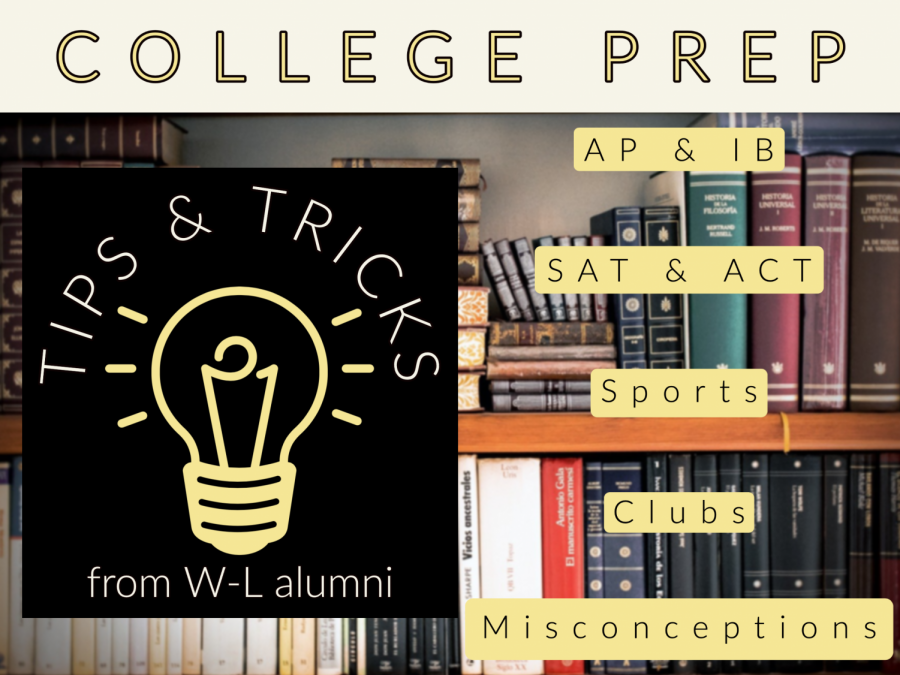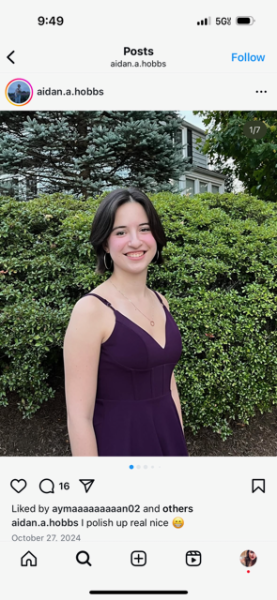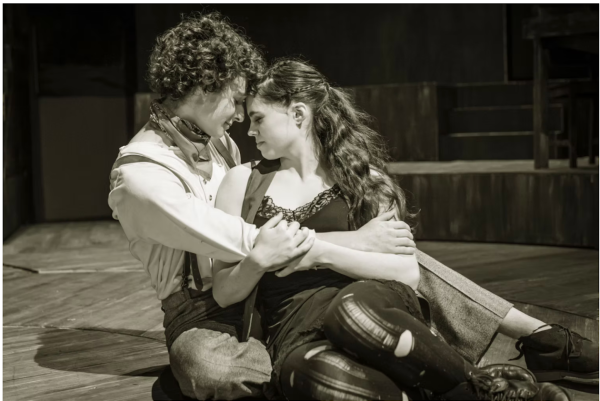The ABCs of college preparation: Insights from W-L alumni
College preparation — a daunting task that millions of students nationwide face each year. Crossed Sabres recently sat down with three of the school’s graduates who are currently enrolled in college: Neil Murray, a junior and accounting major at Temple University in Philadelphia, PA; Zoë Edwards, a senior majoring in Urban and Environmental Policy with a focus on public health at Occidental College in Los Angeles, California; and Sydney VandeMeulebroecke, a sophomore majoring in Sustainable Biomaterials and minoring in green engineering and environmental economics at Virginia Tech in Blacksburg, Virginia. These recent high school graduates offered advice based on their experiences preparing for and transitioning into college.
Prepping for college: the basics
Advanced Placement & International Baccalaureate
The school offers both Advanced Placement (AP) and International Baccalaureate (IB) classes, which are two different programs of college-level courses designed to prepare high school students for college and beyond, with the potential of earning college credits.
“Utilizing the AP and IB [system is] … what prepared me for college,” Murray said.
Murray, Edwards and VandeMeulebroecke each took a combination of AP and IB classes in high school.
“I’m really glad I did not do full IB because I got credit for my AP classes in college,” VandeMeulebroecke said. “I did not get credit for my IB classes and had to retake the courses in college. That credit depends on whether you are fully IB and what school you go to.”
Murray felt similarly about the importance of getting college credit for IB and AP classes.
“I think taking more courses that are AP, particularly that you know you’ll be able to do well on the exam, is something people should really take advantage of,” Murray said. He added that he didn’t fully realize until he had gotten to college how many college credits he could have earned in high school and how much money he could have saved by fully taking advantage of the AP and IB system.
According to these alumni, there is more value to AP and IB classes than just providing college credits.
“The material that the courses give you is going to prepare you for the level of material you have in college,” Murray said. According to Murray, AP and IB classes “require you to think critically” and teach you how to study, which is helpful in preparing for college.
SAT & ACT
The SAT and ACT are standardized tests used to gauge students’ readiness for college. Taking the SAT or ACT is required for admission to many colleges and universities nationwide, but in recent years, a growing number of schools have adopted test-optional admission requirements.
All three alumni interviewed took the SAT and/or ACT.
Murray, who started prepping around spring break in his junior year, tested better on the SAT after taking both the ACT and SAT numerous times.
“I prepped for probably a total of eight months, and my scores kept getting higher and higher….I think it’s a matter of just learning how to take the test,” Murray said.
VandeMeulebroecke had an SAT tutor but would have been open to another approach.
“I wish I had just sat down at the library with friends and taken a bunch of extra practice tests,” she said. “The tutor was helpful but I think the most helpful thing to do is just to block out time to practice, and it’s a lot cheaper to just have a buddy and hold each other accountable to work during that time.”
Extracurricular activities
A big question for college preparation is which extracurriculars will make high schoolers more competitive on college applications.
“Gain outside of school work experience … not only for applying for college but also [for] jobs and internships once you’re in college,” Murray recommends, “because you’re not really going to be able to get a whole lot of experience when you’re [busy taking classes].”
Edwards, who now plays D3 lacrosse, was more focused on sports in high school, where she was a member of both the swim and lacrosse teams. She offered her advice for balancing extracurriculars.
“The best thing to do when preparing for college is really engaging in every aspect of your community by way of athletics, community service and clubs,” she said.
On the other hand, VandeMeulebroecke favored involvement in clubs.
“In high school I held leadership positions through SCA [Student Council Association] that allowed me to continue leadership work in college,” she said. “It was really good for me to start trying new things in high school where the setting was smaller so that I was ready to try a bunch of new clubs and put myself out there in college.”
Choosing the best college (for you)
When applying to colleges, students need to consider different aspects they’re looking for, such as location, price, available majors, the campus and more.
“I wanted a small school that would provide me with really great relationships with my professors,” Edwards said.
But VandeMeulebroecke urges not to put too much pressure on the process or on yourself.
“Transfering is also always an option,” she said.
Facing misconceptions
Having gone through the transition from high school to college, the three alumni debunk some myths about college.
As a high schooler, Murray thought that college professors would be inflexible, but later learned otherwise.
“As long as you communicate, you’re friendly and you make sure you’re on top of things…[professors are] going to do what they can to help you,” Murray said. He added that he has connected with many of his professors over coffee outside of class.
Edwards’ thinking was more along the lines of academics.
“The biggest misconception about college is that your time is always best spent studying,” Edwards said. “While it is obviously important to focus on your studies in college, it is also important for you to focus on yourself and who you are and who you are becoming. There will always be time to have at least a little bit of fun.”
VandeMeulebroecke addressed the aspect of mentally adjusting to college.
A misconception was that college would feel “like home straight away,” VandeMeulebroecke said. “It took me so long to adjust to college and living by myself, and I’m still adjusting. I felt like I had chosen the wrong school or was doing things wrong, but really it just takes different people different amounts of time to get used to college and find their people.”
Encountering the unexpected on campus
Murray was most shocked by the amount of free time he has in college.
“Being able to sit down immediately after one class and knock out all the work I have for the week in an hour-and-a-half was eye opening,” Murray said. “You absolutely have more free time in college than you do in high school…if you do your assignments the day they’re assigned, you’re going to enjoy your social life a lot at college, just because you’ll have a lot of flexibility.”
The number of opportunities to participate on campus was unexpected for VandeMeulebroecke.
“I was most surprised by how many things there are to get involved with,” she said.
Sharing a few of their favorite things
“My favorite thing is all of the opportunities you have to try new things,” VandeMeulebroecke said, reflecting on the best aspects of college.
Murray evaluated how one of the best things about college has affected him on a deeper level.
“[My favorite part of college is] the independence that I didn’t know I didn’t have,” Murray said. “You can see yourself progress and grow as a person pretty quickly.”
Preparing for success
Murray and VandeMeulebroecke both attributed a part of their preparedness to W-L.
“I was prepared academically,” VandeMeulebroecke said. “W-L did a great job of teaching me all the skills I needed to keep myself organized and on track with school work.”
Murray was also appreciative of his high school experience.
“Through work experience and talking with teachers at W-L, I think learning how to communicate with professors efficiently and clearly was something that I came into college being able to do well,” Murray said.
Offering tips to current high schoolers
“Having a good foundation on how to write would be my biggest tip,” Murray said. His second piece of advice is to “utilize the AP and IB system…because they really do prepare you [especially for writing-intensive courses in college].”
Edwards’ advice centers less around AP and IB classes but instead on the pressure of choosing what to study.
“My biggest tip for current high schoolers preparing for college is to know that it is okay if you do not know what you want to study in college,” she said. “College is the time for you to find and identify your passions and fields of interest.”
VandeMeulebroecke had similar thinking.
“I think it’s important to not dig yourself into the hole of one major,” VandeMeulebroecke said. “There are so many opportunities out there and you will find something you love, don’t be too set on one thing.”
Prepping for college: high school in hindsight
Murray reflects on what he might have done differently in high school to prepare for college, given his newfound college experience.
“I wish I had stronger extracurriculars that were not school-oriented,” he said. “I wish I didn’t take as many IB courses…because a lot more schools accept AP credits than IB credits.”
VandeMeulebroecke drew on her own experience with the college application process.
“I did way too many applications, which just took more time and money,” she said.
Edwards’ advice differed.
“Something I wish I had done in high school was not put as much pressure on myself,” Edwards said.
Tying it together
The three recent graduates reflected on their college preparation process and adapting to college life.
“[What matters most is] how open and willing you are to try new things and meet new people,” VandeMeulebroecke said.
Murray’s opinion on preparedness is also based on personal outlook.
“Push yourself to be uncomfortable in high school,” Murray said. “Push yourself outside of your limits…academically [and] socially. Just push yourself to understand more…actively seeking to learn is something I wish I had been doing more before going to college.”
Edwards’ ingredients for successful college preparedness encompass a balance between school and extracurriculars.
“[The] most important components for getting into college and feeling prepared are community involvement…and taking rigorous classes,” Edwards said. “Together, they really can teach you time management and finding that perfect school/life balance to remain happy.”










